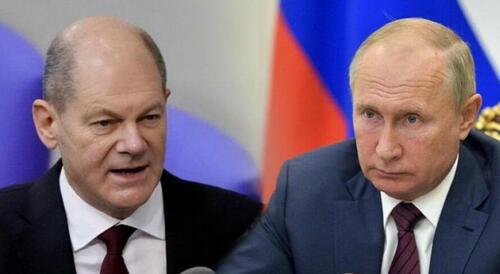Potential near-term Russia-Ukraine negotiations to end the war continue to move toward reality in the wake of Donald Trump's election win.
German Chancellor Olaf Scholz and Russian President Vladmir Putin are planning to hold their first phone call in almost two years on Friday.

Bloomberg was the first to report the development, citing several sources, and highlights the uncertainty felt in Europe concerning Ukraine policy over Trump's return to the White House. "Germany is Ukraine’s second-biggest supporter after the US and has pledged billions of euros in additional aid," it notes.
Scholz first announced Sunday his desire to speak to Putin "soon" about achieving peace in Ukraine, bringing the war to an end. "Yes, I decided to talk to the president of Russia at the right time. But I'm a responsible politician, I don’t do it alone," Scholz told a German broadcaster.
The timing of the German leader's words suggest Trump being in the White House provides the nudge to get serious about diplomacy and negotiations with Moscow:
Scholz spoke with U.S. President-elect Donald Trump on Sunday, with the German chancellor’s spokesman saying the two discussed working "toward a return to peace in Europe."
The last phone call between Putin and Scholz was all the way back in December 2022. Scholz made the call to urge that Russian troops leave Ukraine and return home, and there's been radio silence between the two throughout the war.
Since then, German Foreign Minister Annalena Baerbock has insisted that Putin was "no longer even prepared" to speak with the chancellor, amid Berlin ramping up is military support for Ukraine and drastically expanding its defense budget.
France's Macron had been the only European leader to hold semi-regular contact with Putin throughout the opening months of the war, but he came under severe criticism from some corners of Europe for doing so.
But the mood change in Washington is clearly changing the mood in war-weary Europe as well. Now, even Ukraine is getting the memo - that there's about to be a different track.
"Ukrainian officials have said for months that they would not cede territory occupied by Russia in any peace settlement. Now, as Ukraine contemplates an accelerated timetable for negotiations pushed by President-elect Donald J. Trump, it is putting at least as much importance on obtaining security guarantees as on where an eventual cease-fire line might fall," NY Times wrote Thursday.
"The territorial question is extremely important, but it’s still the second question," one Ukrainian official told the Times. "The first question is security guarantees."
Trump's team has been talking about pressuring Kiev to halt aspirations to join NATO for twenty years. It would likely be on that basis that Ukraine will seek pledges from Western partners for protection in the event Moscow breaks any potential deal.